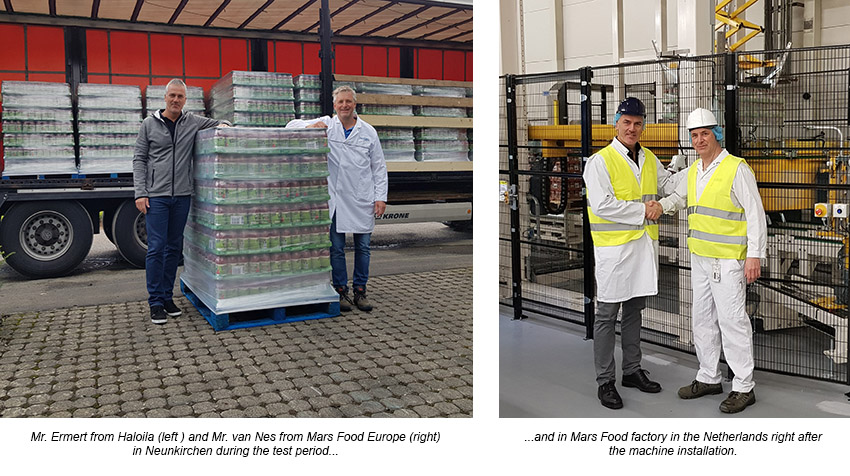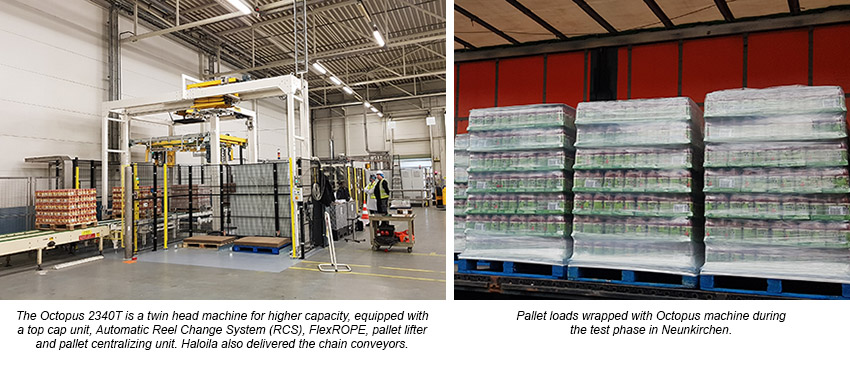
Octopus in Outer Space
February 28, 2018 10:03 am |Case study Mars Food Europe, Netherlands
Early in 2017 one of our Key Account Managers was contacted by Mars Food Europe, which is one of the Mars Corporation business units specializing in food, e.g. pasta sauce in glass jars. The company was looking for a totally new packaging philosophy for transporting their products to the consumers.

|
Mars Food transports glass jars which can be sensitive to transit damage, but remain a durable and hygienic food container. Mars were especially looking for a cost-effective, sustainable, and stable solution for pallet load packaging and Haloila worked to develop a partnership with Mars Food to provide the best solution to pack their products for both storage and transportation. Mars Food focused on utilizing the technology of the Octopus at their factory in the Netherlands. The Haloila Octopus stretch wrapping machine offers a number of features to provide an optimized solution by applying stretch film to the parts of the pallet where it is absolutely necessary to have a solid, steady load with the minimal film to provide film cost savings. Haloila works closely with its sister company Mima Films, and together with Mars Food they completed pallet test trials at the Virton center in Belgium to understand the film savings whilst also testing different options to provide the optimum wrapping pattern for the glass jars. As sustainability is one of the core values of Mars Food, by thorough testing the aim was to find out how to reduce the impact on environment. By optimizing the film usage and increasing the number of product layers on a pallet a significant amount of waste can be reduced. Also the carbon dioxide emissions can be diminished as more products can be transported using less trucks. |
The test started with a thorough evaluation of the existing pallet packaging process. Mainly the units arrived as compact loads, but some of the pallets were slightly deformed. The more film layers there were on a pallet load, the more deformed the loads were.
A further request from Mars Food was to increase the pallet layers and the pallet height in order to reduce the transport costs. During the evaluation the pallet corners were discovered to be partly torn once the film was removed from the pallet, and the cardboard trays containing the jars also suffered some level of deformity.
After evaluating the current method, Haloila and Mima Films proposed their solution to Mars Food. Following a thorough testing process, consisting of shaking, vibrating and a simulated crash test, Haloila were able to demonstrate the optimum wrapping solution using their Octopus wrapping machine.
The main principle of the proposal was to have an Octopus machine with a roping feature to ensure the bottom of the pallet was secure. Additionally there would be a top cap unit applying cardboard protection to the top of the pallet and an Automatic Reel Change System (RCS) for improved safety and uninterrupted operation, as the RCS film reel can be changed without entering inside the machine safety fence area.
Mars Food was pleased with the test report at the Virton factory, but to totally convince Mars Food that the Octopus solution would be perfect for Mars, further tests were arranged. Haloila arranged a “live test”, and three full trucks were sent for wrapping at Haloila’s premises in Neunkirchen, Germany. In total 72 pallets came to Neunkirchen made up of three different sizes of glass jars.

During the final testing Haloila was able to increase the number of glass jar layers from six to seven high which had previously been impossible, whilst at the same time provide the optimum packaging for Mars. The film savings were found to be approx. ~55%, and also the top sheet film was found to be unnecessary. On top of the pallet a cardboard top cap could be used to protect the jars from dust instead of a film top sheet.
The new stretch wrapping process improved the packaging quality and load stability especially during the transportation and storage phase. The amount of film used, and the amount of damaged jars has since reduced, whilst hazardous film tails as well as broken film and damaged cardboard trays have also been avoided.
The project was completed in less than a year. It started early in 2017 when Haloila’s Key Account Manager met the customer together with Mima Films in the Mars Food Europe plant in Oud-Beijerland, based in the Netherlands. Originally the plan was to deliver the machine in 2018 but in July 2017 Mars asked to speed-up the project and the Octopus 2340T was delivered in December 2017.

Haloila has excellent long term relationship with Mars and therefore a suitable solution for Mars was easily created as many of the special requests are already known and could be taken into account when proposing a solution for Mars.
In this case the support from our sister company Mima Films was a valuable asset in order to meet the special requirements from Mars regarding the film quality, amount of used film and wrapping pattern ultimately required.
Today, the Mars family of Associates is more than 100,000 people in over 80 countries around the world. Through all the growth over the years, Mars has remained a private, family-owned business, with passionate Associates who are united and guided by The Five Principles — Quality, Responsibility, Mutuality, Efficiency and Freedom. These are the heart of everything Mars does. (http://www.mars.com/global/).
Mars Sustainability program web site
Mars Sustainability program video
Interested to hear more? Contact us for further information.
Tags: case story, food industry, Octopus, stretch wrapping, wrapping machine
Categorised in: Case stories

